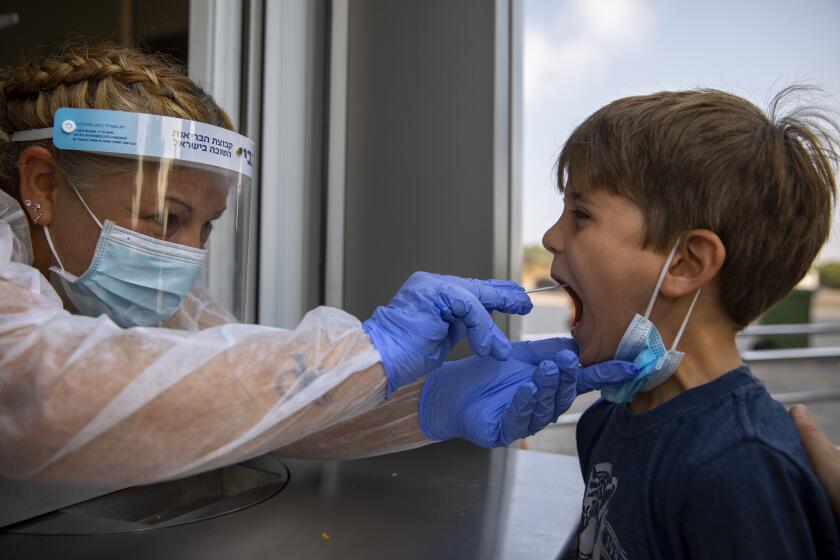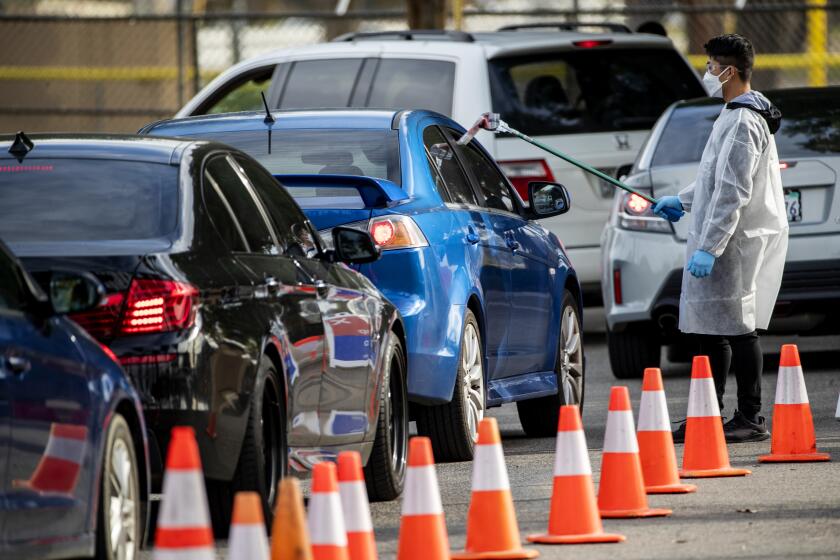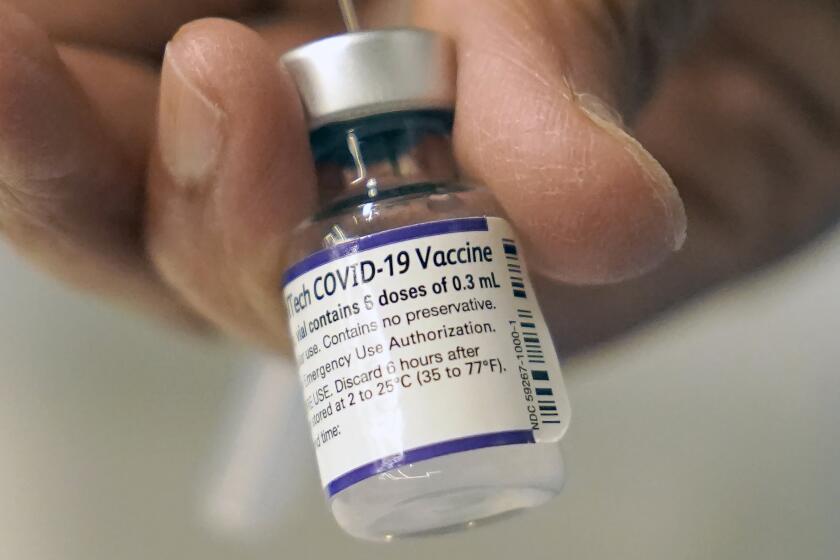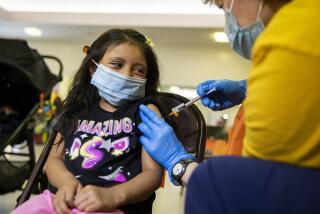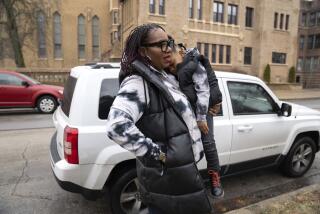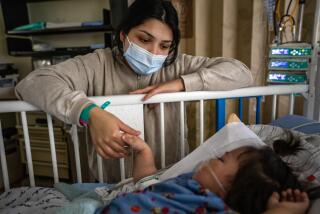Hospitalizations skyrocket in kids too young for COVID shots
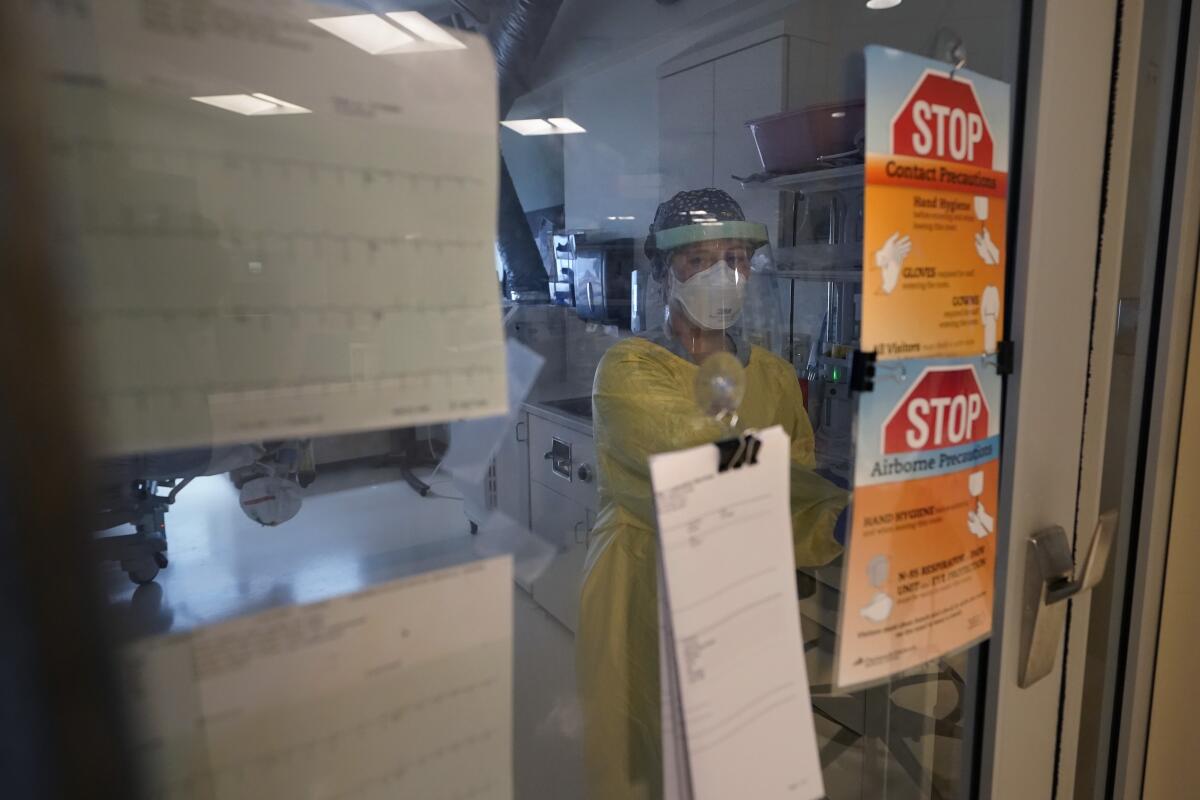
- Share via
Hospitalizations for COVID-19 among U.S. children under 5 soared in recent weeks to their highest level since the pandemic began, according to government data released Friday on the only age group not yet eligible for vaccination.
The worrisome trend underscores the need for older kids and adults to get their COVID-19 shots to help protect those around them, said Dr. Rochelle Walensky, director of the Centers for Disease Control and Prevention.
With the highly contagious Omicron variant spreading around the country, the hospitalization rate in these youngest kids has surged to more than 4 in 100,000 children, up from 2.5 per 100,000 in mid-December
The rate among children ages 5 to 17 is about 1 per 100,000, according to the CDC data, which are drawn from more than 250 hospitals in 14 states.
Overall, “pediatric hospitalizations are at their highest rate compared to any prior point in the pandemic,” Walensky said.
She noted that just over 50% of children ages 12 to 18, and only 16% of those 5 to 11, are fully vaccinated.
The overall hospitalization rate among children and teens is still lower than that of any other age group. And they account for less than 5% of average new daily hospital admissions, according to the CDC.
Still, as of Tuesday, the average number of under-18 patients admitted to the hospital per day with COVID-19 was 766 — double the figure reported just two weeks ago.
The apparently milder Omicron variant has some parents thinking it might be helpful to let their kids get infected. But experts say there’s no upside.
The trend among the very youngest kids is being driven by high hospitalization rates in five states: Georgia, Connecticut, Tennessee, California and Oregon, with the steepest increases in Georgia, the CDC said.
At a briefing, Walensky said the numbers include children hospitalized because of COVID-19 and those admitted for other reasons but found to have coronavirus infections.
The CDC also said the surge could be partially attributable to how COVID-19 hospitalizations in this age group are defined: a positive virus test within 14 days of hospitalization for any reason.
The severity of illness among children during the Omicron wave seems lower than it was with the Delta variant, said Seattle Children’s Hospital critical care chief Dr. John McGuire.
“Most of the COVID+ kids in the hospital are actually not here for COVID-19 disease,” McGuire said in an email. “They are here for other issues but happen to have tested positive.”
Early research points to mutations in the spike protein. But much remains unknown or unconfirmed.
Dr. Anthony Fauci, the nation’s top infectious-disease expert, said this week that Omicron appears to cause less-severe disease across the board, but that the sheer number of infections due to its extreme contagiousness will mean that many more children will get infected, and a certain share of them will wind up in the hospital.
Fauci also said many children hospitalized with COVID-19 have other health conditions that make them more susceptible to complications from the virus. These includes obesity, diabetes and lung disease.
Fauci and Walensky have emphasized that one of the best ways to protect the youngest children is to vaccinate everyone else.
The surge in hospitalizations only heightens some parents’ worries.
Emily Hojara and Eli Zilke of Sawyer, Mich., are being extra protective of their daughter Flora, who turns 2 in May. They limit her contact with other children, and no visitors are allowed in the house unless masked, not even grandparents.
“It’s been a struggle, and now with this new variant, I feel it’s knocked us back,” Hojara said.
“It’s scary that she can’t be vaccinated,” she said of her daughter.
Dr. Jennifer Kusma, a pediatrician with Chicago’s Lurie Children’s Hospital, said she has seen increasing numbers of kids hospitalized with Omicron, and while most aren’t severely ill, she understands parents’ worries.
“I really wish we already had that vaccine for these young kids,” Kusma said. But she added that what may seem like a long wait should reassure parents that vaccine testing is not being rushed.
The CDC is urging everyone 12 and older get a COVID-19 booster to help fight the Omicron variant.
Many had hoped the new year might bring a vaccine for young children, but Pfizer announced last month that two doses didn’t offer as much protection as hoped for in youngsters 2 to 4.
Pfizer’s study has been updated to give everyone under 5 a third dose, and results are expected in early spring.
Also on Friday, the CDC issued a report showing the Pfizer-BioNTech shots seem to protect older children who develop a serious but rare COVID-19-linked condition that involves inflammation of multiple organs.
Among 102 kids ages 12 to 18 who were hospitalized with the condition, none who had received two Pfizer shots at least 28 days earlier needed ventilators or other advanced life support. By contrast, 40% of unvaccinated children required such treatment.
The condition, multisystem inflammatory syndrome, causes symptoms that may include persistent fever, abdominal pain and rashes. Most children recover, but 55 deaths have been reported.
A separate CDC report found that children who had COVID-19 were more than twice as likely to be diagnosed with diabetes as youngsters who had not had the virus. Scientists are investigating why but say the virus seems to attack insulin-producing cells in the pancreas.
Associated Press medical writer Carla K. Johnson contributed from Seattle.
